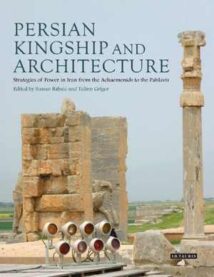نام کتاب: Persian Kingship And Architecture – Strategies Of Power In Iran From The Achaemenids To The Pahlavis
نویسنده: Sussan Babaie و Talinn Grigor
ویرایش: ۱
سال انتشار: ۲۰۱۵
کد ISBN کتاب: ۱۸۴۸۸۵۷۵۱۹, ۹۷۸۱۸۴۸۸۵۷۵۱۳,
فرمت: PDF
تعداد صفحه: ۳۲۰
حجم کتاب: ۷۷ مگابایت
کیفیت کتاب: OCR
انتشارات: I. B. Tauris
Description About Book Persian Kingship And Architecture – Strategies Of Power In Iran From The Achaemenids To The Pahlavis From Amazon
Since the Shah went into exile and the Islamic Republic was established in 1979 in the wake of the Iranian Revolution, the very idea of monarchy in Iran has been contentious. Yet, as Persian Kingship and Architecture argues, the institution of kingship has historically played a pivotal role in articulating the abstract notion of ‘Iran’ since antiquity. These ideas surrounding kingship and nation have, in turn, served as a unifying cultural force despite shifting political and religious allegiances. Through analyses of palaces, mausolea, art, architectural decoration and urban design the authors show how architecture was appropriated by different rulers as an integral part of their strategies of legitimising power. They refer to a variety of examples, from the monuments of Persepolis under the Achamenids, the Sassanian palaces at Kish, the Safavid public squares of Isfahan, the Qajar palaces at Shiraz and to the modernisation and urban agendas of the Pahlavis. Drawing on archaeology, ancient, medieval, early and modern architectural history, both Islamic and secular, this book is indispensable for all those interested in Iranian studies and visual culture.
درباره کتاب Persian Kingship And Architecture – Strategies Of Power In Iran From The Achaemenids To The Pahlavis ترجمه شده از گوگل
از زمانی که شاه به تبعید رفت و جمهوری اسلامی در سال ۱۹۷۹ در پی انقلاب ایران تأسیس شد، ایده سلطنت در ایران مورد مناقشه بوده است. با این حال، همانطور که پادشاهی و معماری ایرانی استدلال می کند، نهاد پادشاهی از قدیم الایام نقشی محوری در بیان مفهوم انتزاعی «ایران» داشته است. این عقاید پیرامون پادشاهی و ملت، به نوبه خود، علیرغم تغییر وفاداری های سیاسی و مذهبی، به عنوان یک نیروی فرهنگی متحد عمل کرده اند. نویسندهاز طریق تحلیل کاخها، مقبرهها، هنر، تزئینات معماری و طراحی شهری نشان میدهند که چگونه معماری توسط حاکمان مختلف به عنوان بخشی جداییناپذیر از استراتژیهای مشروعیت بخشیدن به قدرت آنها تخصیص یافته است. آنها به نمونههای مختلفی اشاره میکنند، از بناهای تخت جمشید در دوران هخامنشیان، کاخهای ساسانی در کیش، میادین عمومی صفویه اصفهان، کاخهای قاجاریه در شیراز و مدرنسازی و برنامههای شهری پهلویها. این کتاب با تکیه بر باستان شناسی، تاریخ معماری باستان، قرون وسطی، اولیه و مدرن، اعم از اسلامی و سکولار، برای همه علاقه مندان به ایران شناسی و فرهنگ تجسمی ضروری است.
[box type=”info”]![]() جهت دسترسی به توضیحات این کتاب در Amazon اینجا کلیک کنید.
جهت دسترسی به توضیحات این کتاب در Amazon اینجا کلیک کنید.![]() در صورت خراب بودن لینک کتاب، در قسمت نظرات همین مطلب گزارش دهید.
در صورت خراب بودن لینک کتاب، در قسمت نظرات همین مطلب گزارش دهید.

